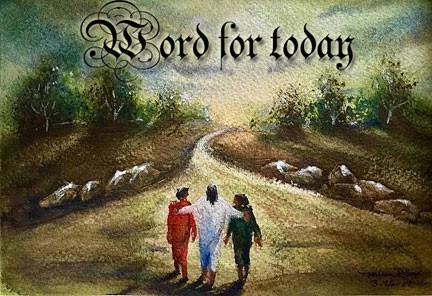Watch
Events
Articles
Market
More
Let Thy Kingdom Come!
by Dr Garth Grenache
and his Lighter Orchestra
[Verse 1]
Father Yah in Sky
Thy great name, set apart!
Let thy kingdom come!
[Verse 2]
Darkness in our land!
All the world, in its hand!
Let thy kingdom come!
[Verse 3]
Let thy will become;
As in sky, so on earth.
Let thy kingdom come!
[Verse 4]
Come to judge the world!
Save our souls, God of old!
Let thy kingdom come!
[Chorus]
We seek thy righteousness,
And thy eternal hand.
Oh save thy Yis-ra-’el
Restore them to the Land.
When nations gather ’round
Then thou shalt take thy stand.
Thy Son with flashing sword
Subdueth every band.
[Verse 5]
Thanks O Father Yah!
Love for aye, we bless thee!
Let thy kingdom come!
[Verse 6]
Everlasting reign!
Wonders strong, signs amaze!
Let thy kingdom come!
[Verse 7]
Overpow’ring all,
Mighty hand, none can stop!
Let thy kingdom come!
[Verse 8]
Thee O Yah we praise!
Humble thou, all the proud!
Let thy kingdom come!
[Chorus]
We seek thy righteousness,
And thy eternal hand.
Oh save thy Yisra’el
Restore them to the Land.
When nations gather ’round
Then thou shalt take thy stand.
Thy Son with flashing sword
Subdueth every band.
[Outro]
Hallelu Yah!
Hallelu, Ya-hw-wa!
Let thy kingdom come!
Hallelu Yah!
Hallelu, Ya-hw-wa!
Let thy kingdom come!



So whoever knows the right thing to do and fails to do it, for him it is sin.
James 4:17 ESV
This is about what you do, but it's even more about the heart than the deed.
https://youtube.com/shorts/gl09Pp8dY5A



What Sort of Savior…? | #salvation



091025 / 16th day of the 6th month 5786
WORD FOR TODAY “are you strong and courageous?”: Jos 1:7 "Only be strong and very courageous; be careful to do according to all the law which Moses My servant commanded you; do not turn from it to the right or to the left, so that you may have success wherever you go.
WISDOM FOR TODAY: Pro 23:12 Apply your heart to discipline And your ears to words of knowledge.
www.BGMCTV.org




Psalm 54:2, “Hear my prayer, O God; listen to the words of my mouth.” This is certainly not a silent prayer or a mere thought in David’s mind. He is Crying out to our Creator, pleading for Him to listen. One can feel the distress in David’s heart as the words are read. God not only heard David, He helped guide him through his trouble and if we would be humble enough to cry out like David did, our Creator will do the same for us.


